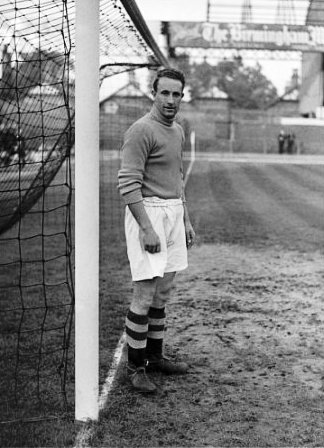

Martin: Cornelius Joseph (Con)
1946-1948
(Player Details)
Left Half/Centre Half
Born: Rush, Co.Dublin, Republic of Ireland: 20-03-1923
Debut: v Sheffield United (a): 04-01-1947
6'1Ē 13st 0lb (1948)
The 6' 2" Martin was a naturally gifted spoetsman and was equally adept at Gaelic football,
soccer and basketball. While he won most honours at soccer, his own belief was that he was a
better Gaelic football player. He had the physique, could kick with either foot, was good at
catching the ball and was very fit. After initially playing Gaelic Football, in his teens, he
was called into the Dublin senior panel aged just eighteen, helping the Dubs to the Leinster
title in 1942. However, at the same time he was lining up for Dublin, he was in the Flying Corps
and also playing soccer for Drumcondra. When this was discovered, Martin was expelled from the GAA
and it wasn't until thirty years later that the Association eventually agreed to award him the
Leinster medal he won. He converted to football and spent four years with Drumcondra, where he won
an FAI Cup Winnersí medal in 1945-46, and represented the League of Ireland against the Irish
League as a left-back. After that game , he was approached by Elisha Scott's Belfast Celtic, but
Glentoran offered him much more money and he bought himself out of the Air Corps and became a
full-time professional in the summer of 1946. Glentoran paid £500 for his services and he was soon
selected for Ireland's tour of Iberia in 1947, where he won his first cap for the Republic of
Ireland. He made his debut against Portugal, and when goalkeeper Ned Courtney was injured he was
handed the goalkeeper's jersey. He kept a clean sheet and he was picked in that position in a 1-0
win over Spain in Madrid the following Sunday. His performance in that historic 1-0 win
sufficiently impressed Manchester United that they offered him a contract. However, Leeds United
offered him a contract as an outfield player at the same time and he opted for Elland Road. While
Manchester United went on to become one of the strongest sides of the time, Leeds floundered. He
had scored once in twenty-two games for Glentoran before he joined Leeds in December 1946 for
£8,000 and quickly established himself at left half, but was equally adept in the centre-half
role, the position he played for the Eire team. He soon attracted the attention of other clubs
and the hard-up United were forced to sell him to Aston Villa for £10,000 in October 1948, the
cash being used to rebuild the Leeds side. He enjoyed his best days at Villa staying until July
1956, scoring once, a Good Friday penalty at Charlton Athletic in a 4-1 win on 7th April 1950,
in making one hundred and ninety four League appearances, and nineteen F.A. Cup games. He then
joined Waterford as Player-Manager and remained there until taking over as Player-Manager of
Dundalk for the 1959-60 season. After Managing Shelbourne for a short time in 1965 he had a spell
as Assistant Manager of Cork Hibernian. He later worked as an Insurance Agent and established an
Insurance Company with his son-in-law. He captained both Ireland and the Republic of Ireland and
was in the Eire team which inflicted Englandís first home defeat by a non-UK team at Goodison
Park by two goals to nil in 1949, with Martin scoring the first goal from the penalty spot. The
versatility of the dual Irish International was legendary, for he played every position at senior
level including goalkeeping appearances for the Republic of Ireland and Aston Villa. His ball
handling skills learned in Gaelic football were put to good use in his goalkeeping art and not
only was he initially sought by Manchester United in the goalkeeping role but he played one full
season for Aston Villa as custodian. The season was 1951-52 and in his first match he started as
left-back, with Joe Rutherford in goal, but after the keeper was injured he took over between the
posts as his replacement in the game and then he kept goal in twenty-six League matches and in
one FA Cup match, before the keeper returned and Martin reverted to the centre-half position. In
many ways, Martin had the misfortune of playing in the same era as Johnny Carey. Carey was an
excellent footballer, while Martin's strength and physical presence meant that while he was just
as effective, he lacked the panache of the Manchester United man. Like Carey, Martin was
incredibly versatile and he even made his second appearance for Ireland as a goalkeeper, though
centre back was his favoured position. Martin finished with thirty Republic of Ireland caps and
six Northern Ireland appearances. His total was passed by his son, Mick, who played in fifty-one
Eire internationals and with Bohemians, Manchester United and Newcastle United. His grandson
Alan was on Leeds Unitedís books as an associate schoolboy but did not make it past the junior
level. Another grandson, Owen Garvan, has already been capped by the Republic of Ireland at
Under-Twenty-one level and plays for Ipswich Town. He died in Dublin on 24th February 2013, aged
eighty-nine.